小学五年级英语下册重点句型及短语汇总 2
人教版五年级英语下册重点句型及语法

人教版五年级英语下册重点句型及语法第一单元1、其他日常活动:eat breakfast 吃早饭 eat lunch吃午饭 eat dinner 吃晚饭get up起床 go to bed 上床睡觉 wash my clothes 洗我的衣服watch TV看电视 go swimming 去游泳 go running去跑步do homework 做作业 do kungfu练武术 play ping-pong打乒乓球play football踢足球 play basketball打篮球 play the pipa弹琵琶play music 演奏音乐 finish class 结束上课 start class 开始上课in the water/sea 在水里/在海里 is good at 擅长 get off 逃脱 lots of 许多2、频度副词。
always总是,一直(100%)usually通常(80%) often 经常(60%)sometimes(30%)有时3、疑问词。
when什么时候 why 为什么 what 什么重点句型。
1、询问别人什么时候做某事的句型及回答。
句型结构:问:When do you+动词短语原形+其他?(你/你们什么时候做某事?)答:I/we(+频度副词)+动词短语原形+at+具体时间(我/我们通常在几点做某事。
)例:问:When do you go to bed?(你什么时候上床睡觉?)答:I go to bed at 9:00p.m (我晚上9点上床睡觉。
)注意:当主语是第三人称单数(he,she,it,单个人名或单数名词)时,助动词do要变成doe s,句型结构是:when does+主语(第三人称单数)+动词短语原形+其他?2、询问别人周末做什么的句型及回答。
句型结构:问:What do you do on the weekend?(你周末做什么?)答:I(+频度副词)+动词(短语)+其他。
小学五年级英语下册各单元重点词语短语汇总
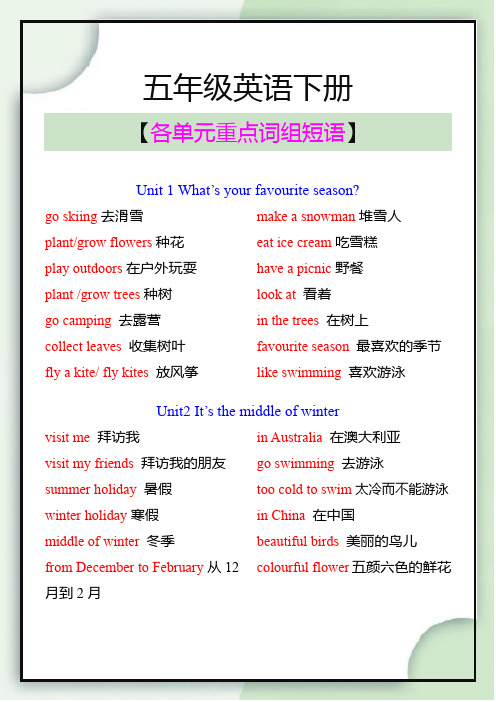
五年级英语下册【各单元重点词组短语】Unit 1 What’s your favourite season?go skiing去滑雪plant/grow flowers种花play outdoors在户外玩耍plant /grow trees种树go camping去露营collect leaves收集树叶fly a kite/ fly kites放风筝make a snowman堆雪人eat ice cream吃雪糕have a picnic野餐look at 看着in the trees 在树上favourite season最喜欢的季节like swimming 喜欢游泳Unit2 It’s the middle of wintervisit me 拜访我visit my friends 拜访我的朋友summer holiday 暑假winter holiday寒假middle of winter冬季from December to February从12月到2月in Australia 在澳大利亚go swimming去游泳too cold to swim太冷而不能游泳in China在中国beautiful birds美丽的鸟儿colourful flower五颜六色的鲜花Unit3 We are going to have an English testsee a film看电影have a party开一个聚会on June 11th在6月11日an English test一次英语考试tomorrow evening 明天晚上visit the museum参观博物馆anything else important其他重要的事情visit a farm参观农场have a sport meeting开校运会the school open day学校开放日New Year’s Day元旦Teachers’ Day 教师节Children’s Day 儿童节Women’s Day 妇女节May Day 劳动节Spring Festival 春节Christmas 圣诞节Mother’s Day 母亲节Tree Planting Day植树节Unit4 Have a good time in Hainanin Hainan在海南on Tuesday 在星期二for five days 持续五天的go for a picnic举行一次野餐all day 整天in the pool 在池里on the beach在海滩上under the stars 在星光下fly back home飞回家at noon在中午mountain climbing爬山have a good time过得愉快Unit 5 Would you like to go with us?plan to do计划去做go on a picnic去野餐at the school gate在学校门口see a film 看电影have a party举行一次聚会watch a football match 观看一场足球赛Unit 6 See you the partyinvite…to… 邀请…去做…call me on打我的电话at 2 p.m. 在下午两点钟at a surprise part在一个令人惊喜的聚会on this special day在这个特殊的日子里at the school meeting room在学校会议室Unit 7 We will go by trainon foot 步行the Great Wall 长城the Summer Palace颐和园take a walk 散步plan for the holiday假期计划go traveling去旅行go by train 乘火车去on October 2nd在10月2日come back home 回家ride a bike 骑自行车go boating 去划船see the picture show 看画展have fun娱乐visit Window of the World 参观世界之窗Unit8 Ben’s first trip to Beijingby plane乘飞机trip to Beijing去北京旅行fly back home 搭乘飞机回家by underground 乘地铁on Friday morning在星期五早上an exciting trip一次激动的旅行drive to the Great Wal l开车去长城in Wangfujing Street在王府井大街take a walk around the lake环湖散步Unit9 Be careful!come on来吧;快点;赶快watch out 注意fall down 跌倒in trouble 遇到麻烦the hot water 热水get sick 生病be careful 小心cut yourself 割伤你自己climb a tree 爬树eat a bad apple吃一个坏苹果touch a fan 摸风扇feed the animals喂动物get hurt 受伤help each other 互相帮助Unit 10 How to stay safecross the street过马路climb tall trees爬很高的树in the street在大街上during school hours在学校期间at the traffic lights在交通灯区on the stairs在楼梯上from strangers从陌生人那里safety crossing安全的路口take money拿钱safety first安全第一Stay safe保持安全Unit 11Can you tell me the wayover there 在那边the way to 去…的路turn right向右转turn left向左转at the second crossing在第二个十字路口on the left在左边on the right在右边next to the school 在学校的隔壁Excuse me. 劳驾;请原谅post office邮局You’re welcome.不客气We’re lost. 我们迷路go straight ahead直走train station 火车站police station警察局Unit 12 I know a shirt cutshort cut 捷径on time 及时;按时in front of 在…前面in ten minutes在十分钟内get there到达那里get to the cinema到达电影院out of their house从他们的房子走出来take the first right在第一个路口右转start to walk quickly开始赶快a different way一条不同的路the main street 大街主干walk through the park走路穿过公园。
人教版PEP五年级下册英语全册重点句型
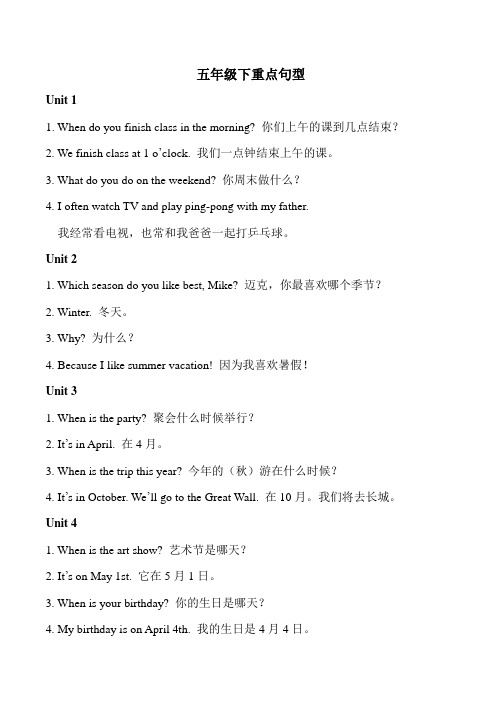
五年级下重点句型Unit 11. When do you finish class in the morning? 你们上午的课到几点结束?2. We finish class at 1 o’clock. 我们一点钟结束上午的课。
3. What do you do on the weekend? 你周末做什么?4. I often watch TV and play ping-pong with my father.我经常看电视,也常和我爸爸一起打乒乓球。
Unit 21. Which season do you like best, Mike? 迈克,你最喜欢哪个季节?2. Winter. 冬天。
3. Why? 为什么?4. Because I like summer vacation! 因为我喜欢暑假!Unit 31. When is the party? 聚会什么时候举行?2. It’s in April. 在4月。
3. When is the trip this year? 今年的(秋)游在什么时候?4. It’s in October. We’ll go to the Great Wall. 在10月。
我们将去长城。
Unit 41. When is the art show? 艺术节是哪天?2. It’s on May 1st. 它在5月1日。
3. When is your birthday? 你的生日是哪天?4. My birthday is on April 4th. 我的生日是4月4日。
Unit 51. The yellow picture is mine. 那幅黄颜色的画是我的。
2. Are these all ours? 这些都是我们的画吗?3. Whose is it? 这是谁的?4. It’s Zhang Peng’s. 是张鹏的。
5. Is he drinking water? 他在喝水吗?6. No, he isn’t. He’s eating. 不是。
人教版小学PEP英语五年级下册知识点归纳
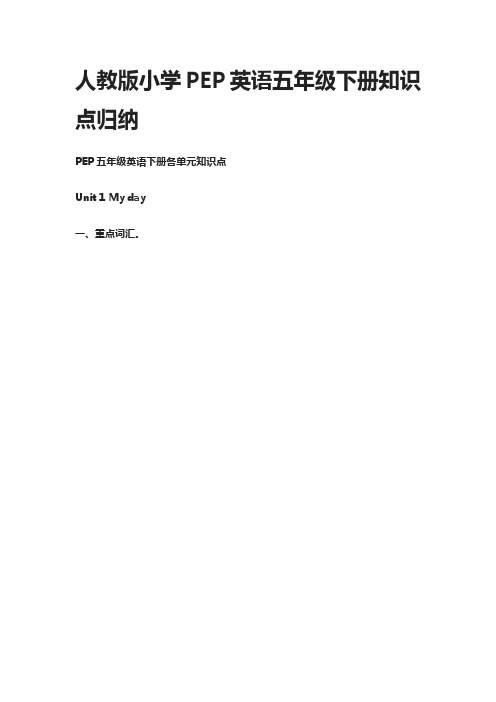
人教版小学PEP英语五年级下册知识点归纳PEP五年级英语下册各单元知识点Unit 1 My day一、重点词汇。
五、重点句型。
1、询问别人什么时候做某事的句型及回答。
句型结构:问:When do you+动词短语原形+其他?(你/你们什么时候做某事?)答:I/We(+频度副词)+动词短语原形+at+具体时间(我/我们通常在几点做某事。
)例:问:When do you go to bed?(你什么时候上床睡觉?)答:I go to bed at 9:00p.m (我晚上9点上床睡觉。
)注意:当主语是第三人称单数(he,she,it,单个人名或单数名词)时,助动词do 要变成does,句型结构是:When does+主语(第三人称单数)+动词短语原形+其他?2、询问别人周末做什么的句型及回答。
句型结构:问:What do you do on theweekend?(你周末做什么?)答:I(+频度副词)+动词(短语)+其他。
例:问:What do you do on theweekend?(你周末做什么?)答:I usually read books. (我通常看书。
)注意:当主语是第三人称单数(he,she,it,单个人名或单数名词)时,助动词do 要变成does,句型结构是:What does+主语(第三人称单数)+do+on the weekend?六、四会句子:When do you finish class in the morning ? 你们上午的课到几点结束?We finish class at 1 o’clock . 我们一点钟结束上午的课。
What do you do on the weekend ? 你周末做什么?I often watch TV and play ping-pong with my father . 我经常看电视,也常和我爸爸一起打乒乓球。
七、语音:cl /kl/ clean clock class cleverpl /pl / plate eggplant please play Unit 2 My favourite season三、重点句型1、询问别人天气怎么样的句型及回答。
外研版小学五年级英语下册M2重点句型和短语

外研版小学五年级英语下册M2重点句型和短语外研版三起五年级英语下M2重点句型和短语一、短语:1.learn English学英语2.wear these clothes穿这些衣服3.in lots of Chinese cities在许多中国城市4.foreign language外语5.Welcome to Beijing!欢迎到北京!6.go shopping购物7.take a walk散步8.do one`s homework做作业9.make a cake 做蛋糕10.ten years ago十年前11.teach Chinese教汉语12.in his class在他的班里13.a good pupil一个好学生14.study very hard学习非常努力15.be retired退休16.an English teacher一位英语老师17.five years ago五年以前18.walk to school=go to school on foot步行去学校19.go to school去学校20.by school bus乘校车21.write a letter写信22.write an email写电子邮件23.on the computer在计算机上24.not I or you不是我也不是你25.pass through刮过26.put down their heads低下他们的头27.pass by身边通过(刮过)28. read a book看书二、句型:1.Why is she wearing these clothes?Because she was a dancer.为什么她穿这些衣服?因为她是一个舞蹈家。
【why提问的是一个原因,其答语常用“because”引导的句子来回答。
Dancer“舞蹈家”,在英语中表示“人”的单词大部分以“-er”结尾,再如:teacher老师;farmer农民;driver司机;brother兄弟;sister 姐妹;等等】【is wearing是现在进行时态,表示现在动作正在发生或进行,其结构是:be(am.is.are)+动词ing形式;be随主语的单复数及人称变化。
(完整版)小学五年级英语下册重点句型及短语汇总
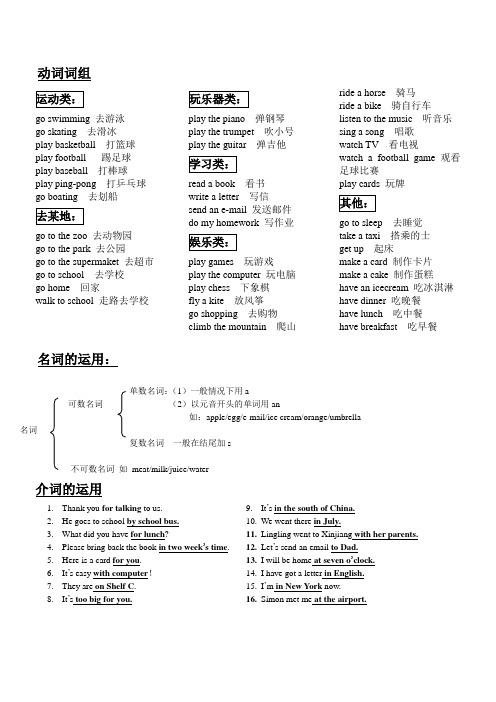
动词词组go swimming 去游泳go skating 去滑冰play basketball 打篮球play football 踢足球play baseball 打棒球play ping-pong 打乒乓球go boating 去划船go to the zoo 去动物园go to the park 去公园go to the supermaket 去超市go to school 去学校go home 回家walk to school 走路去学校play the piano 弹钢琴play the trumpet 吹小号play the guitar 弹吉他read a book 看书write a letter 写信send an e-mail 发送邮件do my homework 写作业play games 玩游戏play the computer 玩电脑play chess 下象棋fly a kite 放风筝go shopping 去购物climb the mountain 爬山ride a horse 骑马ride a bike 骑自行车listen to the music 听音乐sing a song 唱歌watch TV 看电视watch a football game 观看足球比赛play cards 玩牌go to sleep 去睡觉take a taxi 搭乘的士get up 起床make a card 制作卡片make a cake 制作蛋糕have an icecream 吃冰淇淋have dinner 吃晚餐have lunch 吃中餐have breakfast 吃早餐名词的运用:单数名词:(1)一般情况下用a可数名词(2)以元音开头的单词用an如:apple/egg/e-mail/ice cream/orange/umbrella 名词复数名词一般在结尾加s不可数名词如meat/milk/juice/water介词的运用1.Thank you for talking to us.2.He goes to school by school bus.3.What did you have for lunch?4.Please bring back the book in two week’s time.5.Here is a card for you.6.It’s easy with computer!7.They are on Shelf C.8.It’s too big for you.9.It’s in the south of China.10.We went there in July.11.Lingling went to Xinjiang with her parents.12.Let’s send an email to Dad.13.I will be home at seven o’clock.14.I have got a letter in English.15.I’m in New York now.16.Simon met me at the airport.一般过去时:表示过去某个时间里发生的动作或状态。
小学五年级英语下册UNIT2单词及短语默写

五年级英语下册UNIT2单词及短语默写
一、单词部分:
季节春天夏天秋天冬天野餐摘;采集
雪人哪一个最;最高程度地雪因为假期
粉色;粉色的可爱的;美丽的叶子叶子(复数)
落下;{美}秋天用颜料绘画
二、短语部分:
去野餐摘苹果去游泳
做的好最喜欢的季节在海里游泳
堆雪人在雪里玩放风筝吃冰激凌
种花整天睡觉晴朗且凉爽
晴朗且炎热多风且温暖多风且凉爽
多风且寒冷
三、主要句子:
今天天气怎么样?晴朗又炎热。
你最喜欢哪个季节?
我最喜欢冬天。
夏天是很好,但是秋天是我最喜爱的季节。
你为什么喜欢夏天?因为我可以在湖里游泳。
你为什么喜欢冬天?因为我可以整天睡觉。
最新苏少版五年级英语下册重点句型汇总(全册)
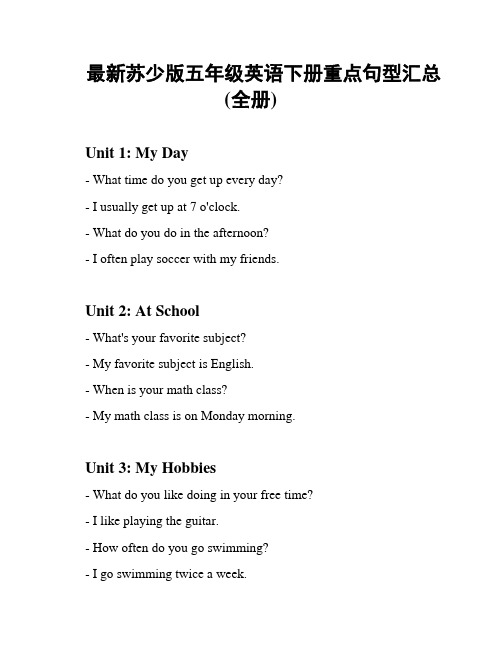
最新苏少版五年级英语下册重点句型汇总(全册)Unit 1: My Day- What time do you get up every day?- I usually get up at 7 o'clock.- What do you do in the afternoon?- I often play soccer with my friends.Unit 2: At School- What's your favorite subject?- My favorite subject is English.- When is your math class?- My math class is on Monday morning.Unit 3: My Hobbies- What do you like doing in your free time?- I like playing the guitar.- How often do you go swimming?- I go swimming twice a week.Unit 4: My Family- Do you have any brothers or sisters?- Yes, I have one brother and one sister. - What does your father do?- My father is a doctor.Unit 5: Food and Drinks- What's your favorite fruit?- My favorite fruit is watermelon.- Do you like milk?- Yes, I like milk very much.Unit 6: My Town- Is your town big or small?- My town is small.- What's your favorite place in your town? - My favorite place is the park.Unit 7: Weather and Seasons- What's the weather like in winter?- It's cold in winter.- Which season do you like the most? - I like spring the most.Unit 8: Clothes- What do you usually wear in summer? - I usually wear shorts and a T-shirt.- Do you like wearing hats?- No, I don't like wearing hats.Unit 9: In the Zoo- What animals can you see in the zoo? - You can see lions, tigers, and giraffes. - Can you feed the animals in the zoo? - No, we can't feed the animals.Unit 10: My Body- How many fingers do you have?- I have ten fingers.- Can you touch your nose with your tongue?- No, I can't touch my nose with my tongue.Unit 11: Sports Day- Do you like Sports Day?- Yes, I like Sports Day.- What sports can you play?- I can play soccer, basketball, and badminton.Unit 12: Holidays- When is Children's Day?- Children's Day is on June 1st.- Where do you usually go on vacation?- I usually go to the beach on vacation.以上是最新苏少版五年级英语下册的重点句型汇总,包括了每个单元的常用句型和问题。
五年级英语下册单词和重点句型

五年级英语下册单词和重点句型一、单词1.animal(动物)- a living creature such as a dog or cat that is not a human being例句:I love animals, especially dogs.2.cloud(云)- a white or grey mass in the sky, made up of very small floating drops of water例句:Look at the clouds in the sky, they are so beautiful.3.continue(继续)- to keep happening, existing, or doing something without stopping例句:The rain continued for several hours.4.exercise(锻炼)- physical activity that you do to make your body strong and healthy例句:I do exercises every morning to keep fit.5.fruit(水果)- something sweet that grows on a tree or bush and contains seeds or a stone covered by skin例句:I like to eat apples, oranges, and other fruits.6.island(岛屿)- a piece of land that is completely surrounded by water例句:We went to a beautiful island for our vacation.7.nature(自然)- everything in the physical world that is not controlled by humans, such as plants, animals, and natural events例句:I love spending time in nature, it helps me relax.8.picnic(野餐)- a meal that you have outside, often with friends, where you take food and drink with you例句:Let's have a picnic in the park this weekend.9.popular(受欢迎的)- liked by many people; frequently chosen or used例句:Harry Potter books are very popular among children.10.subject(科目)- an area of knowledge, especially one that you study at school, college, or university例句:My favorite subjects at school are English and Science.11.vegetable(蔬菜) - a plant or part of a plant that is eaten as food.例句:Eating vegetables is good for your health.12.mountain(山) - a large natural elevation of the earth's surface rising abruptly from the surrounding level; a large hill.例句:The mountains are covered with snow in winter.13.river(河) - a large natural stream of water flowing in a channel to the sea, a lake, or another river.例句:The river flows through the city.14.ocean(海洋) - a very large area of sea.例句:The ocean is full of mysteries.15.star(星星) - a celestial body that shines by its own light or byreflected light.例句:We can see many stars in the sky at night.16.moon(月亮) - the natural satellite of the earth.例句:The moon is full tonight.17.sun(太阳) - the star around which the earth and other planets revolve.例句:The sun is shining brightly.18.flower(花) - the reproductive structure of angiosperms, typically having brightly colored petals and a sweet fragrance.例句:The garden is full of beautiful flowers.19.book(书) - a written or printed work consisting of pages glued or sewn together along one side and bound in covers.例句:I love reading books.20.pen(钢笔) - an instrument for writing or drawing with ink.例句:I use a pen to write my diary.21.pencil(铅笔) - an instrument for writing or drawing made of a slender rod of graphite or a similar substance enclosed in a wooden casing.例句:I use a pencil to sketch.22.ruler(尺子) - an instrument for measuring or drawing straight lines.例句:I need a ruler to draw a straight line.23.eraser(橡皮) - an object used to remove pencil or ink marks from paper.例句:I can't find my eraser.24.backpack(背包) - a bag with shoulder straps, used to carry books andother items.例句:I carry my books in a backpack.25.desk(书桌) - a table, typically with drawers, at which one can read, write, or do other work.例句:My desk is messy.26.chair(椅子) - a seat with a back and legs, for one person.例句:I sit on a chair to study.27.classroom(教室) - a room in a school or college where classes are held.例句:The classroom is clean and tidy.28.teacher(老师) - a person who teaches, especially in a school.例句:My teacher is very kind.29.student(学生) - a person who is studying at a school or college.例句:I am a student.30.homework(家庭作业) - work that is assigned to students to be done outside of class.例句:I have a lot of homework to do.31.test(考试) - an examination of knowledge or skills, typically by means of questions and answers or practical exercises.例句:I am nervous about the test.32.grade(成绩) - a mark or score given for a piece of work or an examination. 例句:I got a good grade on my test.33.library(图书馆) - a building or room containing collections of books, periodicals, and sometimes films and recorded music for use or borrowing bythe public or a particular group.例句:I like to study in the library.34.bookstore(书店) - a shop that sells books.例句:I went to the bookstore to buy a new book.35.movie(电影) - a series of moving images, usually with sound, that tell a story.例句:I watched a movie last night.36.theater(剧院) - a building or outdoor area where plays and other dramatic performances are given.例句:We went to the theater to see a play.37.music(音乐) - an art form consisting of sound and silence, organized in time.例句:I love listening to music.38.instrument(乐器) - an object used to produce musical sounds.例句:He plays many instruments.39.singer(歌手) - a person who sings, especially professionally.例句:The singer has a beautiful voice.40.dance(舞蹈) - an art form consisting of movements of the body, usually in time to music.例句:She loves to dance.41.sport(运动) - an activity involving physical exertion and skill in which an individual or team competes against another or others.例句:I like to play sports.42.football(足球) - a game played by two teams of eleven players each, usinga round ball which players kick up and down the field in an attempt to score goals.例句:I play football with my friends.43.basketball(篮球) - a game played by two teams of five players each, usinga round ball which players try to throw through a hoop mounted on a backboard at each end of the court.例句:He is good at basketball.44.tennis(网球) - a game played by two or four players on a rectangular court, using a racket and a small, hollow rubber ball.例句:I play tennis on weekends.45.swimming(游泳) - the act of moving through water by using the arms and legs.例句:I go swimming every day.46.running(跑步) - the act of moving quickly on foot by alternately taking one foot off the ground and putting it down in front of the other.例句:I like running in the morning.47.cycling(骑自行车) - the act of riding a bicycle.例句:He goes cycling every weekend.48.hiking(徒步旅行) - the activity of going for long walks in the countryside.例句:We went hiking in the mountains.49.camping(露营) - the activity of spending a night or more outdoors in atent or other shelter.例句:I love camping in the summer.50.park(公园) - a public area of land set aside for recreation and enjoyment, usually with trees, grass, and flowers.例句:We went to the park to have a picnic.51.garden(花园) - a piece of land, usually near a house, used for growing flowers, vegetables, or other plants.例句:My grandmother has a beautiful garden.52.tree(树) - a large plant with a trunk, branches, and leaves.例句:There are many trees in the park.53.leaf(树叶) - a flattened structure growing from a stem or branch of a plant.例句:The leaves are turning red in autumn.54.flowerpot(花盆) - a container in which plants are grown.例句:I planted a flower in a flowerpot.55.bird(鸟) - a warm-blooded vertebrate animal that has feathers, wings, anda beak.例句:I saw a beautiful bird in the garden.56.fish(鱼) - a cold-blooded vertebrate animal that lives in water and has gills, fins, and a tail.例句:There are many fish in the river.57.insect(昆虫) - a small animal with six legs and a body divided into three parts.例句:I saw an interesting insect in the garden.58.butterfly(蝴蝶) - a flying insect with large, brightly colored wings.例句:The butterfly is very beautiful.59.bee(蜜蜂) - a flying insect that makes honey and pollinates flowers.例句:Bees are very busy.60.ant(蚂蚁) - a small insect that lives in colonies and is known for its hard work and organization.例句:Ants are very strong.61.house(房子) - a building for human habitation, usually consisting of a roof, walls, and floors.例句:I live in a big house.62.room(房间) - a part of a building enclosed by walls and a ceiling.例句:My room is very clean.63.kitchen(厨房) - a room or area where food is prepared and cooked.例句:My mother is cooking in the kitchen.64.bedroom(卧室) - a room where one sleeps.例句:I am sleeping in my bedroom.65.bathroom(浴室) - a room containing a bath or shower and often a toilet. 例句:I am taking a shower in the bathroom.66.living room(客厅) - a room in a house used for relaxing and entertaining guests.例句:We are watching TV in the living room.67.furniture(家具) - the movable articles that are used to make a room or building suitable for living or working.例句:We bought some new furniture for our house.68.table(桌子) - a piece of furniture with a flat top and one or more legs, used for eating, working, or playing games.例句:There is a vase on the table.69.chair(椅子) - a seat with a back and legs, for one person.例句:I am sitting on a chair.70.sofa(沙发) - a long, upholstered seat with a back and arms, for two or more people.例句:We are sitting on the sofa.71.bed(床) - a piece of furniture for sleeping or resting on.例句:I am lying on my bed.72.cupboard(橱柜) - a piece of furniture with shelves and doors, used for storing dishes, food, or other items.例句:There are many cups in the cupboard.73.drawer(抽屉) - a box-like compartment that slides in and out of a piece of furniture.例句:I keep my socks in a drawer.74.window(窗户) - an opening in a wall or roof to let in light and air.例句:The window is open.75.door(门) - a movable barrier used to close an opening in a wall or fence. 例句:I opened the door.76.floor(地板) - the surface of a room on which one stands or walks.例句:The floor is clean.77.ceiling(天花板) - the upper surface of a room, usually covered with plaster or other material.例句:The ceiling is high.78.wall(墙) - a vertical structure that divides or encloses an area.例句:The wall is painted white.79.color(颜色) - the visual perception of different wavelengths of light.例句:I like blue color.80.red(红色) - a bright color that is associated with heat, energy, and passion.例句:The rose is red.81.blue(蓝色) - a color that is associated with calmness, stability, and trust.例句:The sky is blue.82.green(绿色) - a color that is associated with nature, growth, and freshness.例句:The grass is green.83.yellow(黄色) - a bright color that is associated with sunshine, happiness, and optimism.例句:The sunflower is yellow.84.purple(紫色) - a color that is associated with royalty, luxury, and creativity.例句:The flower is purple.85.orange(橙色) - a bright color that is associated with energy, warmth, and enthusiasm.例句:The sunset is orange.86.white(白色) - a color that is associated with purity, innocence, and simplicity.例句:The snow is white.87.black(黑色) - a color that is associated with mystery, elegance, and power.例句:The cat is black.88.grey(灰色) - a color that is a mixture of black and white, and is associated with neutrality, balance, and stability.例句:The clouds are grey.89.brown(棕色) - a color that is associated with earth, stability, and reliability.例句:The bear is brown.90.pink(粉色) - a light red color that is associated with femininity, sweetness, and romance.例句:The dress is pink.91.clothes(衣服) - items of clothing.例句:I need to buy some new clothes.92.shirt(衬衫) - a garment for the upper body, typically with a collar, sleeves, and buttons down the front.例句:He is wearing a white shirt.93.pants(裤子) - an outer garment covering the body from the waist to the ankles.例句:I am wearing blue pants.94.skirt(裙子) - a garment for women or girls, hanging from the waist and usually reaching to the knees or ankles.例句:She is wearing a beautiful skirt.95.dress(连衣裙) - a one-piece garment for women or girls, typically with a skirt and bodice.例句:I bought a new dress.96.shoe(鞋子) - an outer covering for the foot, typically made of leather or other material.例句:I need to buy new shoes.97.sock(袜子) - a garment for the foot and lower leg, typically made of cotton or wool.例句:I am wearing white socks.98.hat(帽子) - a head covering.例句:He is wearing a black hat.99.gloves(手套) - a covering for the hand, typically with separate parts for each finger.例句:I am wearing gloves to keep my hands warm.100.coat(外套) - an outer garment, typically with sleeves and a fastening down the front.例句:I am wearing a warm coat.二、重点句型1. What's your favorite...?(你最喜欢的是什么…?)例句:What's your favorite color? - My favorite color is blue.这个句型用来询问对方最喜欢的事物,比如颜色、动物、食物等等。
五年级英语下册重点句型和短语
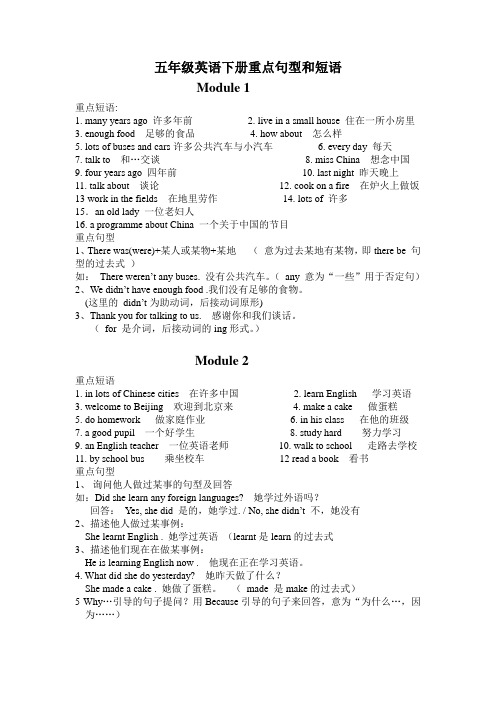
五年级英语下册重点句型和短语Module 1重点短语:1. many years ago 许多年前2. live in a small house 住在一所小房里3. enough food 足够的食品4. how about 怎么样5. lots of buses and cars许多公共汽车与小汽车6. every day 每天7. talk to 和…交谈8. miss China 想念中国9. four years ago 四年前10. last night 昨天晚上11. talk about 谈论12. cook on a fire 在炉火上做饭13 work in the fields 在地里劳作14. lots of 许多15.an old lady 一位老妇人16. a programme about China 一个关于中国的节目重点句型1、There was(were)+某人或某物+某地(意为过去某地有某物,即there be 句型的过去式)如:There weren’t any buses. 没有公共汽车。
(any 意为“一些”用于否定句)2、We didn’t have enough food .我们没有足够的食物。
(这里的didn’t为助动词,后接动词原形)3、Thank you for talking to us. 感谢你和我们谈话。
(for 是介词,后接动词的ing形式。
)Module 2重点短语1. in lots of Chinese cities 在许多中国2. learn English 学习英语3. welcome to Beijing 欢迎到北京来4. make a cake 做蛋糕5. do homework 做家庭作业6. in his class 在他的班级7. a good pupil 一个好学生8. study hard 努力学习9. an English teacher 一位英语老师10. walk to school 走路去学校11. by school bus 乘坐校车12 read a book 看书重点句型1、询问他人做过某事的句型及回答如:Did she learn any foreign languages? 她学过外语吗?回答:Yes, she did 是的,她学过. / No, she didn’t 不,她没有2、描述他人做过某事例:She learnt English . 她学过英语(learnt是learn的过去式3、描述他们现在在做某事例:He is learning English now . 他现在正在学习英语。
五年级下册英语素材- 重点词汇、短语、句子汇总大全

Unit 1 A phone call一、重点词汇二、背诵短语make phone calls 打电话play games 玩游戏across the world 全世界send and get messages 收发信息learn English 学英语phone box 电话亭watch the weather report 看天气预报take notes 作笔记wait a moment 等一下listen to music 听音乐take photos 拍照over there 那儿visit websites 浏览网站do shopping 购物have to 必须watch TV programmes 看电视节目see films 看电影of course 当然write emails 写邮件hurry up 快点三、背诵句子1. See you tomorrow. 明天见。
2. I’ve got a new CD-ROM. 我有一个新光盘。
3. Can you come to my place? 你们能来我家吗?4. Phone your mum and your grandma. 给你们的妈妈和奶奶打电话。
5. What can I do? 我能做什么?手机在全世界非常受欢迎。
6. Mobile phones are very popular acrossthe world.7. I have to ask mum first. 我必须先问问我的妈妈。
8. My father collects stamps. 我的爸爸收集邮票。
9. His parents love music and art. 他的父母热爱音乐和美术。
10.Tom has to get up before 7:00. Tom必须在7:00之前起床。
11.Their uncle has got many CD-ROMs. 他们的叔叔有许多光盘。
五年级下册英语Unit2重点句子归纳

五年级下册英语Unit2重点句子归纳五年级下册英语Unit2重点句子归纳五年级下册英语Unit2重点句子归纳Unit 21.Can I have a toy train? 我能要一辆玩具火车吗?2.I want a toy train. 我想要一辆玩具火车.3.Which one do you like? 你喜欢哪一个?4. I like the blue one. 我喜欢蓝色的那个。
5.How much is it? It’s fifty-six yuan. 它多少钱?56元。
6.We’ll take it. 我们买它了。
7.Here you are. Thank you.给你。
谢谢。
8.What can I do for you? 我能为你做些什么?Can I help you ? 我能帮助你吗?9.I want to buy a motorbike. 我想要买一辆摩托车。
10.How about this one? 这个怎么样?11.It looks nice. I like it. 它看起来很好。
我喜欢他。
12.I want a pair of short pants , please. 我想要一条短裤。
13.How about this pair? 这条怎么样?14.Can I try them on? Sure. 我能试穿吗?当然。
15.They are too big for me. 对我来说太大了。
16.Would you please show me that pair of short pants? Sure.你能给我看看那条短裤吗?当然。
17.How much are these short pants? 这条短裤多少钱?18.They’re sixty-five yuan. 65元。
19.Micky sees some big toys. Micky 看到些大玩具。
see看到look 看(看的过程)20.He’s very happy to play with the toys. 玩这些玩具他很开心。
五年级下册1--4单元重点句型及作文模板

Unit 1重点句型1.When do you...?是由When引导的特殊疑问句,用于询问时间,在具体的时刻前面通常用介词at.通常回答为:主语+频率副词(always,usually,often,sometimes,never)+动词(短语)+at+时间点。
例如:--When do you often get up?你经常几点起床?--I often get up at 6 o’clock.我经常6点起床。
When do you often get up?=What time do you get up?2.当此句型的主语是第三人称单数(he,she,John等)时,助动词要变成does。
句型结构为:When does+主语(第三人称单数)+动词原形+其他。
通常回答为:主语(第三人称单数)+频率副词(always,usually,often,sometimes,never)+动词(短语)+at+时间点。
例如:--When does he get up?他经常几点起床?--He often get s up at 6 o’clock.他经常6点起床。
3.What引导的特殊疑问句,就活动内容进行问答:句型结构为:What+do+主语+do+时间?通常回答为:主语+频率副词(always,usually,often,sometimes,never)+动词短语+时间。
或者 ---Always / Sometimes / Often / Usually+ 主语+动词短语+时间。
例如:--What do you do on the weekend? 你周末做什么?I often play football on the weekend. 我经常在周末踢足球。
4.当主语是第三人称单数时,助动词用does。
其句型结构为:What+does+主语+do+时间?通常回答为:主语(第三人称)+频率副词(always,usually,often,sometimes,never)+动词短语+时间。
外研版英语三起五年级下册单元知识梳理Module 2
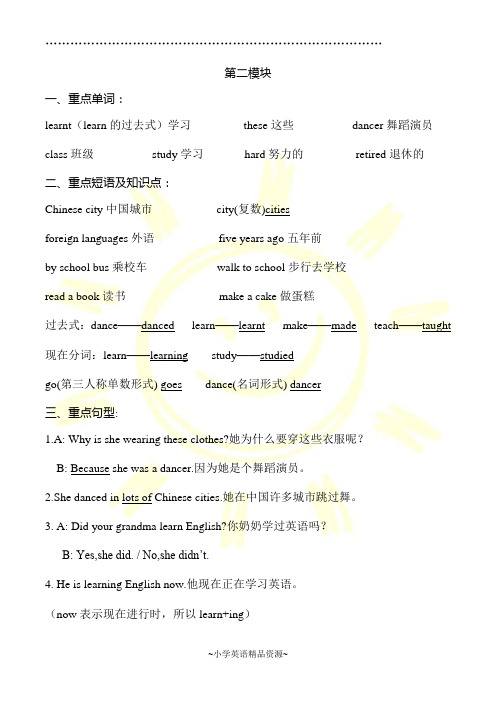
第二模块一、重点单词:learnt(learn的过去式)学习these这些dancer舞蹈演员class班级study学习hard努力的retired退休的二、重点短语及知识点:Chinese city中国城市city(复数)citiesforeign languages外语five years ago五年前by school bus乘校车walk to school步行去学校read a book读书make a cake做蛋糕过去式:dance——danced learn——learnt make——made teach——taught 现在分词:learn——learning study——studiedgo(第三人称单数形式) goes dance(名词形式) dancer三、重点句型:1.A: Why is she wearing these clothes?她为什么要穿这些衣服呢?B: Because she was a dancer.因为她是个舞蹈演员。
2.She danced in lots of Chinese cities.她在中国许多城市跳过舞。
3. A: Did your grandma learn English?你奶奶学过英语吗?B: Yes,she did. / No,she didn’t.4. He is learning English now.他现在正在学习英语。
(now表示现在进行时,所以learn+ing)5. Chen Hai is an English teacher.陈海是一位英语老师。
(English前面要用an)6.Now he goes to school by school bus.他现在坐校车去上学。
(三单形式)7. A:Who are they?他们是谁?B:They’re my grandparents.他们是我的爷爷奶奶。
8. A: Who’s this?这是谁?B:It’s my grandma.这是我奶奶。
五年级英语下册重点句型汇总(人教版)

五年级英语下册重点句型汇总(人教版)五年级英语下册重点句型汇总(人教版)五年级英语下册重点句型汇总(人教版)基本句型:1. 询问喜欢哪个季节:⑴--- Which season do you like best? 你最喜欢哪个季节?---I like +季节+ best. (例:I likespring∕summer∕fall∕winter best) ---或:I like summer, because I can swim in the sea.⑵--- Whatis your favourite season? 你最喜爱的季节是什么?--- Spring∕summer∕fall∕winter is my favourite season.2. 询问天气:--- What is thn 秋天5. 同义句:Which season do you like best? -----What’s yourfavourite season?6. snowy 下雪的cloudy多云的rainy下雨的基本句型:1. 询问生日的时间:⑴---- Whenis your / his / her birthday? 你的/ 他的/ 她的生日在什么时候?---- My / his / her birthday is in June.在六月。
⑵---- Is your / his / her birthday inJuly? 你的/ 他的/ 她的生日在七月吗?---- Yes, it is. / No, it isn’t.2. 询问日期:---- What is the datetoday? / What date is it today? 今天几号?---- It is June 1st. 今天六月一号。
区分:(问星期)---- What dayis it today? 今天星期几?---- It is Sunday. 今天星期天。
五年级下册英语第二单元句型

外研版五年级下册英语第二单元的句型一、询问做某事的时间句型1. “What time does school start?”(学校几点开始上课?)-解析:“what time”用来询问具体的时间点,“does”是助动词,因为“school”是第三人称单数形式,所以助动词用“does”。
-例句:What time does the movie start?(电影几点开始?)2. “My school starts at nine o'clock.”(我的学校九点开始上课。
)-解析:“start at + 时间点”表示在某个时间点开始。
-例句:The concert starts at seven thirty.(音乐会七点半开始。
)二、描述日常活动的时间句型1. “I get up at half past seven.”(我七点半起床。
)-解析:“get up”是固定短语,表示“起床”,“at + 时间点”表示在某个时间。
-例句:She goes to bed at ten o'clock.(她十点睡觉。
)2. “We play in the playground before nine o'clock.”(我们九点前在操场玩。
)-解析:“play in the playground”表示“在操场玩”,“before + 时间点”表示在某个时间之前。
-例句:They finish their homework before eight.(他们八点前完成作业。
)三、比较不同时间做的事情句型1. “In the UK, they don't start school at eight o'clock. They start at nine o'clock.”(在英国,他们不在八点开始上课。
他们九点开始上课。
)-解析:用“don't”表示否定,“at + 时间点”分别说明不同的开始上课时间。
马鞍山市第二小学五年级英语下册 Unit 2 How do you come to school知识

Unit 2 How do you come to school ?一、词汇(能听、说、读、写、用下列词汇)。
四会单词:1. moon 月亮2. street 街,街道3. near 在……附近4. by… 乘(汽车、火车等)5. bus 公共汽车,巴士6. metro 地铁7. taxi 出租车,的士 8. bike 自行车 9. plane 飞机 10. train 火车11. city 城市 12. on foot 步行三会单词:1. ship 轮船2. ride 骑车3. show 给……看4. young 年幼的5. basket 篮子短语:1. your new home 你的新家2. very much 非常3. be far from… 离……远4. live on Moon Street 住在月亮街5. come to school 来学校6. by bus 乘公共汽车7. live near school 住在学校附近8. live in Sunshine Town 住在阳光城9. by metro 乘坐地铁10. by taxi 乘坐出租车11. a taxi driver 一位出租车司机12. through the trees 穿过树13. a new bike 一辆新的自行车14. go to school 去上学15. show his bike to Sam 展示他的自行车给Sam16. too young 太年轻17. think so 这样认为18. in the basket 在篮子里19. go there 去那里20. work on a big ship 在大轮船上工作 21. get there 到达那里22. go to many cities 去许多城市二、句型(能听、说、读、写、用下列句式)。
1. Do you like your new home, Su Hai? 你喜欢你的新家吗, 苏海?解析:do是助动词,其第三人称单数形式是does,否定形式分别为:don’t和doesn’t。
小学五年级下册英语重点句型(Unit2~Unit5)

【导语】英语的基础就是从单词起步到句⼦,所谓的句⼦练习,它包含了你对单词的认知,包含了你对语法知识点的认知,包含了你⼝语能⼒的认知,句⼦练习可以让你知道,⽤英语思维说话是什么样的。
以下是⽆忧考整理的《⼩学五年级下册英语重点句型(Unit 2~Unit 5)》相关资料,希望帮助到您。
⼩学五年级下册英语重点句型(Unit 2) Unit 2 重点句型: 1.What’s your favourite season? 你最喜爱的季节是什么? 2.What’s the weather like in spring?It’s sunny and warm. 春天的天⽓像什么样⼦?⼜晴朗⼜暖和。
3.Which season do you like best?Winter. I can make a snowman. 你最喜欢哪个季节?冬天,我可以堆雪⼈。
4.I can play with snow. 我可以玩雪。
5.Winter is beautiful, but it’s too cold for me. 冬天时美丽的,但是对我来说太冷了。
6.Why do you like winter?Because I can sleep a long time. 你为什么喜欢冬天?因为我可以睡懒觉。
7.When is the best time to go to Beijing? Fall. 去北京的时间是什么时候?秋天。
8. What is the weather like in fall in Beijing? It’s sunny and cool. 北京秋天的天⽓像什么样⼦?⼜晴朗⼜凉爽。
9.What can I do there?You can go to the Great Wall. 我可以在那⾥做什么?你可以去长城。
10.Spring is from March to May. 春天从三⽉到五⽉。
五年级下册英语第二单元语法
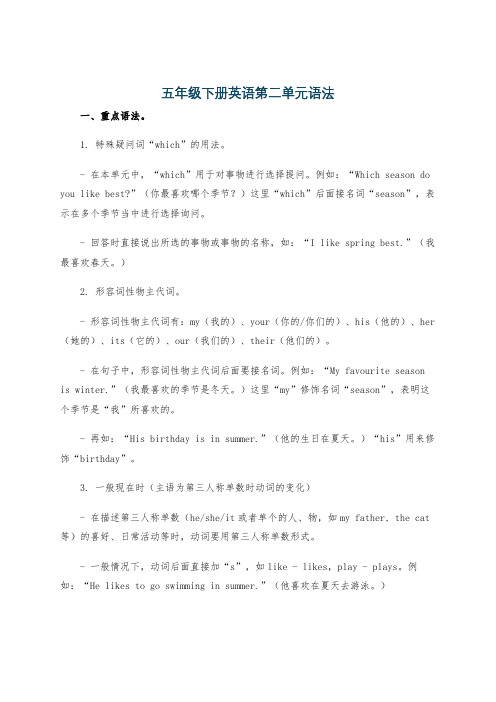
五年级下册英语第二单元语法一、重点语法。
1. 特殊疑问词“which”的用法。
- 在本单元中,“which”用于对事物进行选择提问。
例如:“Which season do you like best?”(你最喜欢哪个季节?)这里“which”后面接名词“season”,表示在多个季节当中进行选择询问。
- 回答时直接说出所选的事物或事物的名称,如:“I like spring best.”(我最喜欢春天。
)2. 形容词性物主代词。
- 形容词性物主代词有:my(我的)、your(你的/你们的)、his(他的)、her (她的)、its(它的)、our(我们的)、their(他们的)。
- 在句子中,形容词性物主代词后面要接名词。
例如:“My favourite season is winter.”(我最喜欢的季节是冬天。
)这里“my”修饰名词“season”,表明这个季节是“我”所喜欢的。
- 再如:“His birthday is in summer.”(他的生日在夏天。
)“his”用来修饰“birthday”。
3. 一般现在时(主语为第三人称单数时动词的变化)- 在描述第三人称单数(he/she/it或者单个的人、物,如my father, the cat 等)的喜好、日常活动等时,动词要用第三人称单数形式。
- 一般情况下,动词后面直接加“s”,如like - likes,play - plays。
例如:“He likes to go swimming in summer.”(他喜欢在夏天去游泳。
)- 以“s, x, ch, sh, o”结尾的动词,加“es”,如go - goes,do - does,watch - watches。
例如:“She does her homework in the evening.”(她在晚上做家庭作业。
)- 以辅音字母 + y结尾的动词,把“y”变为“i”再加“es”,如study - studies。
- 1、下载文档前请自行甄别文档内容的完整性,平台不提供额外的编辑、内容补充、找答案等附加服务。
- 2、"仅部分预览"的文档,不可在线预览部分如存在完整性等问题,可反馈申请退款(可完整预览的文档不适用该条件!)。
- 3、如文档侵犯您的权益,请联系客服反馈,我们会尽快为您处理(人工客服工作时间:9:00-18:30)。
动词词组
go swimming 去游泳
go skating 去滑冰
play basketball 打篮球play football 踢足球play baseball 打棒球
play ping-pong 打乒乓球go boating 去划船
go to the zoo 去动物园
go to the park 去公园
go to the supermaket 去超市go to school 去学校
go home 回家
walk to school 走路去学校
play the piano 弹钢琴
play the trumpet 吹小号
play the guitar 弹吉他
read a book 看书
write a letter 写信
send an e-mail 发送邮件
do my homework 写作业
play games 玩游戏
play the computer 玩电脑
play chess 下象棋
fly a kite 放风筝
go shopping 去购物
climb the mountain 爬山
ride a horse 骑马
ride a bike 骑自行车
listen to the music 听音乐
sing a song 唱歌
watch TV 看电视
watch a football game 观看
足球比赛
play cards 玩牌
go to sleep 去睡觉
take a taxi 搭乘的士
get up 起床
make a card 制作卡片
make a cake 制作蛋糕
have an icecream 吃冰淇淋
have dinner 吃晚餐
have lunch 吃中餐
have breakfast 吃早餐
名词的运用:
单数名词:(1)一般情况下用a
可数名词(2)以元音开头的单词用an
如:apple/egg/e-mail/ice cream/orange/umbrella 名词
复数名词一般在结尾加s
不可数名词如meat/milk/juice/water
介词的运用
1.Thank you for talking to us.
2.He goes to school by school bus.
3.What did you have for lunch?
4.Please bring back the book in two week’s time.
5.Here is a card for you.
6.It’s easy with computer!
7.They are on Shelf C.
8.It’s too big for you.9.It’s in the south of China.
10.We went there in July.
11.Lingling went to Xinjiang with her parents.
12.Let’s send an email to Dad.
13.I will be home at seven o’clock.
14.I have got a letter in English.
15.I’m in New York now.
16.Simon met me at the airport.
一般过去时:表示过去某个时间里发生的动作或状态。
yesterday
many years ago /ten years ago(一段时间+ago)
last week/last weekend/last night/last year
规则变化:1.直接加ed:work—— worked
2.以e结尾的单词,直接加d:live ——lived arrive----arrived
3 以辅音字母+y结尾的,变y为i加ed:study—— studied
4.以重读闭音节结尾的,双写最后的辅音字母+ed:stop—— stopped
不规则变化:is/am-was are-were buy——bought drink——drank
eat——ate have——had learn——learnt make——made see——saw
ride——rode give----gave tell----told go---went win---won draw---drew
become---became spend---spent fly—
flew
1.一般句子
肯定句:I watched TV last night. (我昨晚看电视。
)
He was a driver.(他曾是一名司机)
否定句:I didn't go home yesterday. (我昨天没回家。
)
注意:didn’t 后面用动词原形
2. there be 句型
There was an apple on the table last night.
There weren
3. 一般疑问句
Did you watch TV last night? 肯定回答:Yes, I did.
否定回答:No, I didn't.
Did he/she watch TV last night? 肯定回答:Yes, he/she did. 否定回答:No,he/she didn't.
4.特殊疑问句
What did you do last night?(昨晚你做什么?)
When did you go home last night?(昨晚你什么时候回家?)
Where did you go last night?(昨晚你去哪里?)
一般现在时表示通常性、规律性、习惯性的状态或者动作
当主语是第三人称单数时:(he/she/it/my sister/Sam)
(1)肯定句She likes cats./He goes to shool everyday./My mum sings everyday.
(2)否定句She doesn't like cats.
(3)一般疑问句Does she like cats?
肯定回答Yes,she does.否定回答No,she doesn't.。
